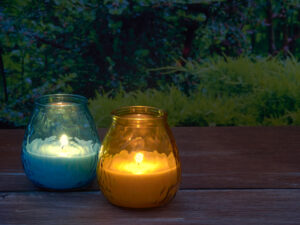Natural Mosquito Protection
 Mosquitos are an inevitable annoyance during the warmer months for most of us. If you’re pregnant, you’re probably already overwhelmed with all the dangers you’re advised to avoid and adding to this list is now mosquito repellents. Same goes for people with sensitive skin, who are between a rock and a hard place in choosing a mosquito repellent that will not irritate their skin and having to deal with mosquito bites until this is achieved.
Mosquitos are an inevitable annoyance during the warmer months for most of us. If you’re pregnant, you’re probably already overwhelmed with all the dangers you’re advised to avoid and adding to this list is now mosquito repellents. Same goes for people with sensitive skin, who are between a rock and a hard place in choosing a mosquito repellent that will not irritate their skin and having to deal with mosquito bites until this is achieved.
What is the main danger?
While Deet, the nickname of the chemical insecticide “N, N-diethl-meta-toluamide” or diethyltoluamide, has been found to be both safe for humans and effective in protecting against mosquito-borne illnesses in does not cease to be a chemical. As such, it should always be used in moderation and it is likely to annoy your skin, especially if you are rather sensitive.
However, the consensus seems to be that it is safe to use mosquito repellents containing Deet while pregnant. Studies are still ongoing as to the exact effects/risks of mosquito repellents on pregnancies, but moderation is key when we don’t have all the answers.
How can women avoid dangerous chemicals, skin reactions, and pesky bug bites?
- Wear lightweight clothes that cover as much skin as possible; for the exposed parts of your body, try an all-natural insect repellent.
- Sandals are not a good idea, as many mosquitoes are attracted to the smell of feet—this is due to their olfactory preferences. Wear socks or long pants that you can tuck into your shoes to prevent bites on your feet.
- Burn citronella candles and/or incense. Also, ask your pharmacist or natural medicine professionals which essential oils are safe to use while pregnant or for your specific body to ward off unwanted bites.
- Wear loose clothing, and not Spandex: mosquitoes bite right through that! You may also want to consider spraying your clothes with repellents, and not your skin. In this manner, you avoid direct contact with potentially harmful chemicals.
- Avoid immersing yourself in deep-wooded areas, or in areas where a lot of vegetation grows. Mosquitoes are attracted to moisture and standing water, or watery areas that are not regularly cleaned.
- If possible, screen your windows and/or porches at your home. That way you can enjoy summer without being attacked by mosquitoes.
- If you’re traveling to an area where there are high risks of insect-borne diseases like Malaria, Zika or West Nile Virus, the potential risks of using Deet can sometimes outweigh those of the viruses. If using repellents with Deet is your best option, they should be used very sparingly. Anti-malarial medications like Doxycycline may also be prescribed.
As always, consult your gynecologist or medical care provider if you have any questions, concerns, or reactions before traveling. Staying indoors or being in a screened-in outdoor area is always a good option when your body needs ensured, natural and healthy protection and can always give you a break from having to put repellents on your body or bundle up with skin-covering clothing.
